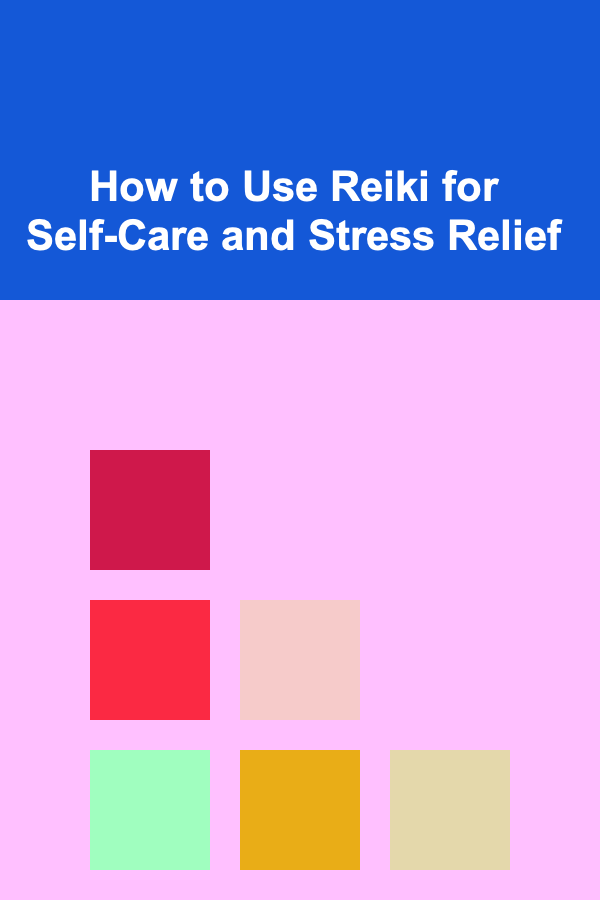
How to Use Reiki for Self-Care and Stress Relief
ebook include PDF & Audio bundle (Micro Guide)
$12.99$11.99
Limited Time Offer! Order within the next:

Reiki is an ancient Japanese healing technique that has gained popularity worldwide as a powerful tool for self-care and stress relief. It involves the practice of channeling universal life energy to promote healing, balance, and relaxation in the body, mind, and spirit. In this comprehensive guide, we will explore how you can use Reiki for self-care and stress relief, offering practical advice on how to incorporate this technique into your daily routine.
What is Reiki?
Reiki is derived from two Japanese words: "Rei," meaning universal, and "Ki," meaning life energy. The practice of Reiki is based on the idea that all living beings have an energy field that flows through them, and when this energy becomes blocked or imbalanced, it can lead to physical, emotional, or spiritual stress. Reiki practitioners believe that by channeling universal energy through their hands, they can help remove blockages and restore balance to the body's energy field.
While Reiki is often practiced by trained practitioners on others, it can also be effectively used for self-care. Self-Reiki involves applying Reiki techniques on oneself to promote relaxation, reduce stress, and maintain a sense of overall well-being.
The Benefits of Reiki for Self-Care and Stress Relief
Reiki can be incredibly beneficial for both physical and mental health. The practice encourages deep relaxation, which can have numerous positive effects on the body and mind. Here are some of the key benefits of Reiki for self-care and stress relief:
1. Reduction of Stress and Anxiety
Reiki promotes a deep state of relaxation, which can help lower the body's stress response. By stimulating the body's natural healing abilities, Reiki helps calm the nervous system, reduce anxiety, and lower cortisol levels. This can lead to an overall sense of peace and well-being.
2. Improved Sleep Quality
Reiki has been shown to improve sleep by relaxing the body and calming the mind. The stress-relieving effects of Reiki can help ease insomnia and other sleep disturbances, making it easier to fall asleep and stay asleep throughout the night.
3. Enhanced Emotional Balance
Reiki can help release emotional blockages, which may have built up over time due to stress, trauma, or negative experiences. It can help restore emotional balance, alleviate feelings of depression, and promote a more positive outlook on life.
4. Pain Relief and Muscle Relaxation
Many people use Reiki to alleviate physical pain and muscle tension. The energy flow during a Reiki session can help release tension, reduce inflammation, and increase circulation, leading to pain relief and improved muscle relaxation.
5. Improved Focus and Clarity
Reiki can clear mental fog and promote clarity, allowing you to better focus on tasks and make decisions with greater ease. The calming effects of Reiki can also help enhance mental clarity and creativity.
How to Practice Reiki for Self-Care and Stress Relief
Practicing Reiki for self-care involves using various techniques to channel energy through your hands to specific areas of the body. Whether you're seeking stress relief, emotional healing, or relaxation, Reiki can be adapted to suit your needs. Here's a step-by-step guide to help you get started with self-Reiki.
1. Create a Calm Environment
Before you begin, it's important to create a peaceful and comfortable environment. Choose a quiet space where you won't be disturbed. You may want to dim the lights, light a candle, or use essential oils to enhance the atmosphere. Play soft, calming music if that helps you relax. Make sure you're in a position that allows you to remain comfortable for the duration of the session, whether you're sitting or lying down.
2. Set Your Intention
Setting an intention is an important part of the Reiki practice. Think about why you're using Reiki---whether it's to relieve stress, calm anxiety, improve your emotional state, or promote physical healing. Focus your mind on your intention and visualize it as you begin the session.
3. Ground Yourself
Grounding helps you connect with the Earth and center your energy before beginning the session. You can do this by sitting with your feet flat on the floor, or lying down with your feet hip-width apart. Take deep breaths and imagine roots extending from the soles of your feet into the Earth, anchoring you to the present moment.
4. Activate the Reiki Energy
In traditional Reiki, practitioners use specific hand positions to channel energy to the body. For self-Reiki, you can use these hand positions or intuitively place your hands on the body where you feel drawn to. Begin by placing your hands on your body in the following areas:
- Crown of the Head (for mental clarity and relaxation)
- Heart Center (for emotional healing)
- Solar Plexus (for stress relief and balance)
- Solar Plexus to Navel (for digestion and energy flow)
- Hands on the Sides of the Body (for overall balance)
Focus on breathing deeply and allow the energy to flow through your hands. If you feel warmth or tingling sensations, that's a sign that energy is moving through your body.
5. Visualize Healing Energy Flowing
As you place your hands on each area, visualize healing energy flowing from your hands into your body. Imagine the energy as a bright, soothing light or as a warm, nurturing force that spreads throughout your entire being. Allow yourself to feel the energy and stay focused on the sensations in your body. Trust that the energy is working on a deeper level to heal and restore balance.
6. Use Affirmations
Affirmations can help enhance the Reiki session by reinforcing the healing process. As you channel energy through your hands, repeat positive affirmations such as:
- "I am calm and at peace."
- "I am grounded and balanced."
- "I release stress and tension from my body."
- "I am open to healing and well-being."
These affirmations can help direct your intention and deepen the effects of the Reiki session.
7. Allow Time for Healing
The duration of your self-Reiki session will depend on your needs and schedule. However, it's recommended to spend at least 15-30 minutes practicing Reiki. During this time, remain in a relaxed state, allowing the energy to flow freely and allowing any emotional or physical sensations to arise.
8. Close the Session
When you're ready to close the session, gently bring your hands to your heart center or place them in your lap. Take a few moments to express gratitude for the healing energy and for the time you've taken to care for yourself. You may also want to perform a grounding exercise to help you feel re-centered.
Tips for Enhancing Your Reiki Practice
To get the most out of your self-Reiki sessions, consider incorporating the following tips into your practice:
1. Practice Regularly
Like any form of self-care, the benefits of Reiki become more pronounced with regular practice. Aim to practice Reiki daily or several times a week, even if it's just for a few minutes. Consistency is key in maintaining a balanced energy flow.
2. Stay Open and Trust the Process
Reiki is a subtle yet powerful practice, and the effects may not always be immediately noticeable. Be patient and trust the process. Over time, you may begin to notice improved physical and emotional health, greater relaxation, and reduced stress.
3. Combine Reiki with Other Healing Practices
Reiki can complement other forms of healing, such as meditation, yoga, or aromatherapy. By combining Reiki with these practices, you can enhance your self-care routine and further promote relaxation and well-being.
4. Seek Guidance if Needed
If you're new to Reiki or feel that you're not getting the results you want, consider seeking guidance from a trained Reiki master. A Reiki master can teach you more advanced techniques, help you clear energy blockages, and provide insights into your practice.
Conclusion
Reiki is a powerful and accessible tool for self-care and stress relief that can bring significant benefits to your physical, emotional, and spiritual well-being. By incorporating Reiki into your daily routine, you can experience reduced stress, improved emotional balance, and a greater sense of peace and relaxation. Whether you're using it to relieve tension, promote healing, or simply recharge, Reiki offers a gentle, holistic approach to self-care that can support your overall health and happiness.
Reading More From Our Other Websites
- [Organization Tip 101] How to Style Your Furniture for Maximum Functionality
- [Hiking with Kids Tip 101] Bite-Sized Peaks: 5 Short Hikes That Won't Exhaust Little Legs
- [Personal Financial Planning 101] How to Invest in the Stock Market: A Beginner's Guide to Building Wealth
- [Home Staging 101] How to Optimize Your Staging Budget: Smart Home Staging Furniture Rental Strategies
- [Personal Care Tips 101] How to Use Body Butter to Soothe Skin After Shaving
- [Polymer Clay Modeling Tip 101] Troubleshooting Common Finishing Mistakes and How to Fix Them Quickly
- [Home Budget 101] How to Stay Within Budget on DIY Home Projects
- [Toy Making Tip 101] Beyond the Basics: Innovative Designs for Interactive Wooden Toy Sets
- [Personal Finance Management 101] How to Understand and Lower Your Tax Bill
- [Personal Care Tips 101] How to Brighten Your Skin with a Face Mask

Mechanical Engineer's Toolkit: Essential Skills and Technologies for Success in the Industry
Read More
The Art of Business Intelligence: Best Practices for Transforming Data into Insights
Read More
How to Optimize Your Home's Appliance Usage for Renewables
Read More
How To Craft a Satisfying Resolution
Read More
How to Build Early Math Skills with Everyday Activities
Read More
Building a Strong Social Media Engagement Strategy
Read MoreOther Products

Mechanical Engineer's Toolkit: Essential Skills and Technologies for Success in the Industry
Read More
The Art of Business Intelligence: Best Practices for Transforming Data into Insights
Read More
How to Optimize Your Home's Appliance Usage for Renewables
Read More
How To Craft a Satisfying Resolution
Read More
How to Build Early Math Skills with Everyday Activities
Read More